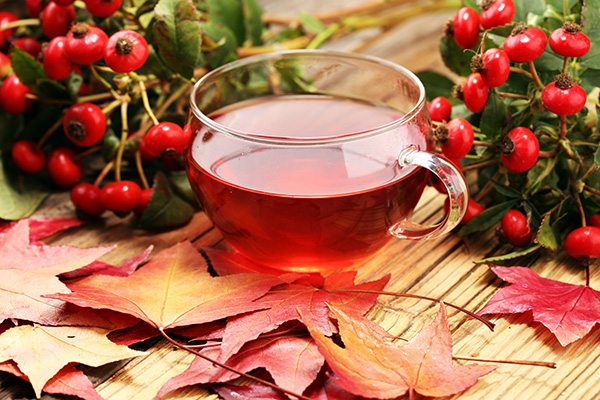What Does Rosehip Tea Taste Like?
For centuries, rosehip tea has been a favored herbal beverage, cherished for its distinctive taste and health advantages.
But what does rosehip tea taste like?
This piece will delve into the taste, health benefits, and potential adverse reactions associated with rosehip tea. We’ll also provide some tips on making and serving your rosehip tea.

What Does Rosehip Tea Taste Like?
The flavor of rosehip tea is mildly sweet, with a subtle tanginess and fruity notes. The taste is often compared to that of cranberries or apples. The tea features an enjoyable, mild tartness that feels refreshing and invigorating.
The tea’s subtle fragrance enhances the overall sensory experience, making it an ideal selection for a calming beverage.
Is Rosehip Tea Bitter?
Rosehip tea is not typically bitter. Its fruity, tangy taste is more on the tart side than bitter. However, if you steep the tea for too long or use excessive rosehips, it may develop some bitterness. To avoid this, follow the recommended brewing instructions and adjust according to your preference.
How Can I Make Rosehip Milk Tea?
Making rosehip milk tea is simple. Here’s a basic recipe:
- Brew a cup of rosehip tea according to the package instructions.
- Warm 1/4 cup of milk or a dairy-free alternative. Use a saucepan or a microwave. Avoid boiling the milk.
- Add honey, sugar, or your favorite sweetener to the milk. Adjust the amount to your taste.
- Pour the sweetened milk into the brewed rosehip tea and stir to combine.
- Enjoy your rosehip milk tea!
How to Serve Rosehip Tea?
Rosehip tea can be served hot or cold.
Steep the tea for 4-7 minutes. After, pour it into your mug. You can add honey, lemon, or a cinnamon stick for extra flavor.
To serve cold, brew the tea as usual, then allow it to cool and refrigerate. Serve over ice, and add a lemon slice or a mint sprig.
What Is Rosehip Tea Good For?
Rosehip tea is packed with vitamins and antioxidants, which provide numerous health benefits:
- Weight loss aid: Several studies in animals and humans suggest that rosehip tea may aid weight loss (1, 2).
- Skin health: The antioxidants in rosehip tea may promote healthier skin and reduce signs of aging (3, 4, 5).
- May protect against heart disease: A few studies have found that consuming rosehip significantly improves blood pressure and lowers bad (LDL) cholesterol levels (6, 7).
- Immune support: High in vitamin C, rosehip tea can help boost your immune system (8, 9, 10, 11, 12, 13).
- Anti-inflammatory: Rosehips have anti-inflammatory properties that may alleviate joint pain and inflammation (14, 15).
What Are the Side Effects of Rosehip Tea?
While most people can safely consume rosehip tea, there are a few potential side effects to take into account:
- Diuretic effects: Rosehip tea might possess gentle diuretic properties, potentially leading to more frequent urination. Also, avoid rosehip tea if you’re taking lithium for psychiatric disorders. Its diuretic effect may raise lithium concentration in your body, leading to severe side effects (16).
- Drug interactions: Rosehip tea may interact with certain medications, such as blood thinners (17).
- May increase the risk of kidney stones in some people: This is connected to its high amount of vitamin C (17).
If anything of the above concerns you, consult your doctor.
Final Thoughts
Rosehip tea is a flavorful and healthful tea that offers a unique taste. The abundance of benefits and limited side effects make rosehip tea a fantastic addition to any tea enthusiast’s collection.
FAQ
Does Rosehip Tea Make You Sleepy?
There is no solid scientific evidence to suggest that rosehip tea has a significant sedative or sleep-inducing effects.
What Is the Difference Between Rosehip and Hibiscus Tea?
Rosehip and hibiscus teas are two different herbal teas, each offering unique flavors and properties.
Rosehip tea, made from the fruit of the rose bush, features a tangy, mildly sweet taste and is celebrated for its vitamin C, antioxidants, and potential health benefits, including immune system support and inflammation reduction.
Hibiscus tea, made from the dried calyces of the Hibiscus sabdariffa plant, is characterized by its tart taste, vibrant red color, and potential health benefits such as reducing blood pressure and improving cardiovascular health.
Both teas are caffeine-free but differ in plant origin, flavors, and specific health properties.
